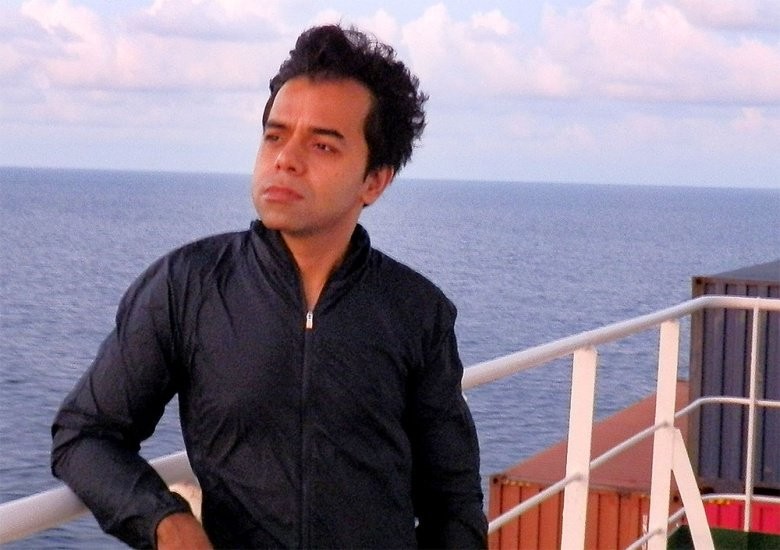Popular Reads
Top Results
Can't find what you're looking for?
View all search resultsPopular Reads
Top Results
Can't find what you're looking for?
View all search resultsShivaji Das: The out-of-the-box traveler
Indian travel writer Shivaji Das is an example of a true traveling hipster.
Change text size
Gift Premium Articles
to Anyone
U
nlike American journalist Elizabeth Gilbert, who wrote the popular travel book titled Eat, Pray, Love, which tells of her journey to mainstream tourism spots in Italy, India and Indonesia, Das prefers to take trips to lesser-known destinations.
The popularity of Gilbert’s book has meant Bali has received recognition as the world’s best tourist destination on TripAdvisor, the world’s largest travel site.
But if you ask Das about Bali, he would say that the resort island is overrated and for him, Madura in East Java, Banjarmasin in South Kalimantan and other lesser-traveled places are no less interesting.
At the Salihara cultural center in South Jakarta on April 22, Das shared stories about his trips to lesser-known places during the launch of his third book, Angels by the Murky River, a collection of travel narratives that he says stay off the beaten track.
The memoir, which took six years to complete, contains 32 stories about his trips to 15 countries, ranging from Indonesia, the Philippines and Australia, to China, South Korea, Iran and Brazil.
“I do like traveling to Indonesia as well as many other countries. What draws me to Indonesia again and again is the wealth of stories, the sheer diversity, and the warmth and honesty of all the people I encounter there,” he said.
The book tells of his meetings with homeless Korean people in Seoul, ageing anarchists in Melbourne, Australia, self-abnegating monks in Singapore, farmers-turned-painters in China, women boxers and beauty pageant specialists in the Philippines, to name a few.
In Indonesia, he met diamond miners in Banjarmasin, salt farmers in Janeponto in South Sulawesi, sulfur miners in Mount Kawah Ijen in Banyuwangi, East Java, and a medicine woman in North Sumatra and others.
Those people, who would not typically attract tourist’s attention, are the “angels by the murky rivers” for the Singapore-based, 38-year-old writer.
Read also: Ten Indonesian travelers who may inspire your next trip
Das travels from one country to another with a mission.
“I wanted to capture human resilience and their capacity for being creative, kind and humorous in the midst of adversity.”
In Banjarmasin, for example, he went to the Pumpung village where his eyes were glued to poverty-stricken diamond miners risking their health for a living.
Under the stinging sun, they slipped and slid in a pit again and again to seek diamonds. When climbing out of the pit, they were almost unrecognizable as they were covered entirely in mud. Then, they dug again into the pit with their shovels before sliding down.
What Das experienced in Pumpung is a world apart from the lavish jewelry stores in Singapore and Jakarta, with their perfect air-conditioning and sharp-suited salespeople and wealthy clients.
For Das, the village gave him an appreciable experience, something that he would not get in well-traveled places where the whole travel experience has been commercialized and prevents visitors from understanding the lives of people.
“That’s why I prefer to travel to lesser-traveled areas where it is possible to realize what I believe traveling is all about — getting enriched by appreciating the diversity of human conditions yet realizing the common humanity that we all share,” he said.
Read also: Indonesian millennial travelers prefer authenticity, new experiences: Study
Before Angels by the Murky River, Das published Journey with the Caterpillar: Travelling through the Islands of Flores and Sumba, Indonesia in 2013, which he said was a humble and humorous attempt to capture the dramatic simplicity of the people living in East Nusa Tenggara.
Das hopes that his book will inspire readers to engage themselves with what he calls “non-required travel,” in which interacting with locals and venturing beyond the walls of tour guides, chain hotels and malls become the main activities.
Das said he believed the kindness of strangers would undoubtedly soften the souls of travelers and help them develop a keen appreciation of what made them all human.
“I hope every reader becomes a fearless traveler and develops the habit of asking the bus driver to stop in an unknown town and run off to its only barber for a non-required haircut,” he said.
“I hope every traveler finds their own angels by the murky rivers,” he added.











